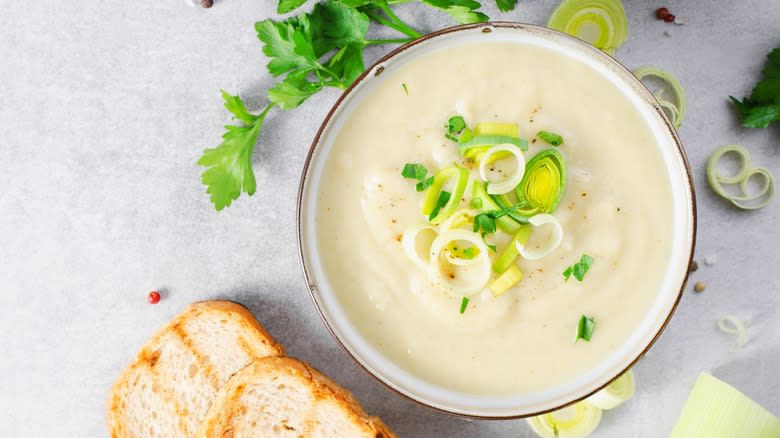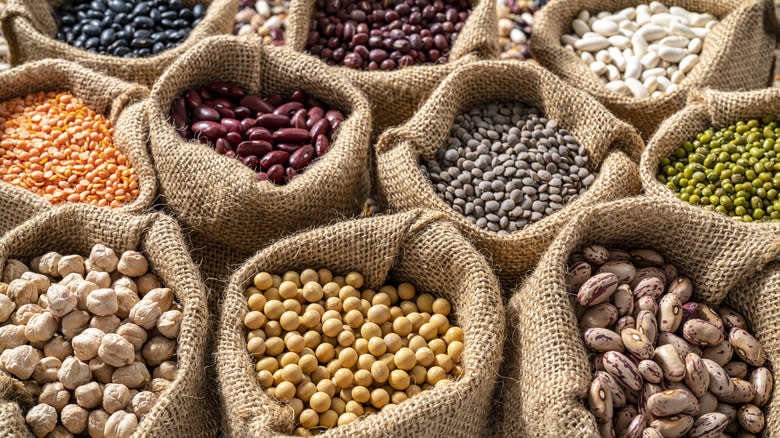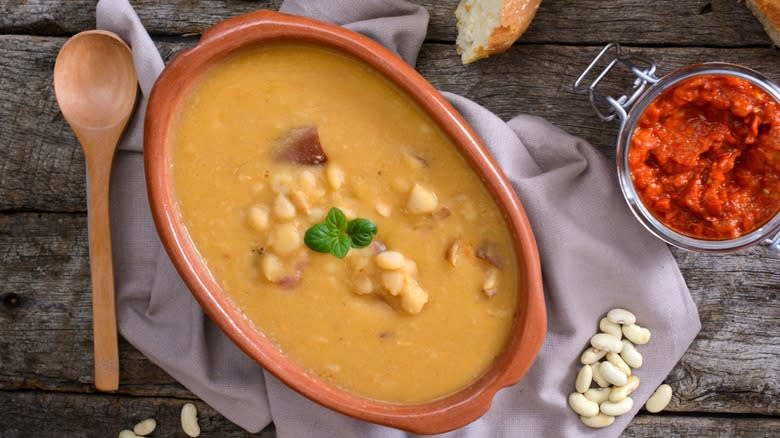Beans Are Your Secret Weapon For Thickening Soups Without Dairy

There are many ways to thicken soup: a roux of butter and flour, a slurry of water and flour or cornstarch, and dairy additions like cream or butter are all classic methods. Some rustic soups like ribollita use bread to thicken them. More modern tricks include thickening soup with dehydrated potato flakes. But there's another way to thicken some soups: Simmer puréed beans in your broth and watch the magic happen.
This thickening action is why many bean-based soups require you to blend some or even most of the beans. Mashing up beans into your soup creates a creamy, thick, stew-like, or even bisque-like viscosity. Whether you're trying to sneak in extra nutrition (think of all the extra fiber!) or you're gluten-free or lactose intolerant and looking for an alternative, puréed beans are a great option to thicken soups. The starchiness of the beans does a similar thing to flour, and their fat and protein acts like cream or whole milk — all three are nutrients that thicken the stock in your soup.
Read more: Canned Soups You Should And Shouldn't Buy
Why Are Beans A Good Thickening Agent?

The food world contains many thickening agents. Pectin is a starch primarily found in fruit that thickens juice into jelly. Gelatin is a collagen-derived protein thickener that makes your stocks richer, stabilizes your mousse, and, yes, makes Jell-o. The proteins in egg yolks thicken liquid when cooked, making delicious pastry cream and custards. And then there are starches — flour and cornstarch, sure, but also the starches found in non-grains, like beans.
Two molecules are responsible for starch: amylose and amylopectin. They're found in rice, starchy vegetables, potatoes, and beans (among other foods). Starch absorbs liquid, thickening the dish. Beans are high in starch; they are, according to a study published by ACS Publications, between 60-70% starch and 15-30% protein. Once that starch is freed by puréeing or mashing the bean from its skin, the starch molecules get to work absorbing liquid. As they swell from the liquid they take on, the broth in your soup becomes thicker, creating a creamy consistency. All beans contain a good amount of starch, with minimal differences between the standard grocery store offerings. For instance, USDA data shows that tinned chickpeas contain 12.8 grams per 100g of starch, which is the high end, but tinned cannellini beans — on the low end but benefiting from a mild flavor — contain 11.3 grams per 100g.
What Soups Can You Thicken With Which Beans?

Any beans you have on hand can be used to thicken a soup, but keep in mind that they may have different aesthetic and taste profiles; adding black beans to your white chicken chili will make it a bit muddy. Adding kidney beans or chickpeas to a delicate corn chowder can change the flavor. There are some soups that, by their very nature, are meant to be thickened with beans. Black bean or white bean soup and split pea soup, for example. If your chili is on the runny side, mash up some beans and let it simmer as the starch gets to work thickening it up.
Soups that aren't usually thickened with beans but can hold up to a subtle bean-y flavor are everywhere. Chicken soup is a great place to add some puréed white beans if you're trying to cut back on cream. Even cream of mushroom soup can be thickened with beans instead of dairy, either by completely replacing the cream or cutting back in favor of puréed beans. Chicken tortilla soup can be thickened with black beans for a heftier bowl, as can minestrone. Next time you make tomato soup, try blending in puréed white beans instead of cream to make a perfectly thick bowl for dunking grilled cheese.
Read the original article on Daily Meal
Solve the daily Crossword

